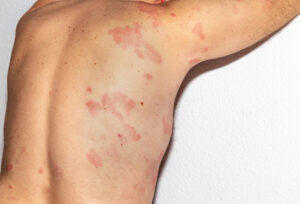July 07, 2020 | Black & Kletz Allergy

Causes:
Theoretically any drug may trigger DRESS syndrome, but the medications most commonly implicated are drugs that are used to treat seizures (e.g., carbamazepine, phenytoin, phenobarbital), gout (e.g., allopurinol), antibiotics (e.g., especially penicillin), and many anti-viral medications (e.g., boceprevir, telaprevir, abacavir, nevirapine)
The exact mechanism of the hypersensitivity to drugs causing this condition is not clearly understood. It does not involve the antibodies that cause immediate allergic reactions, but is rather mediated by lymphocytes which cause delayed hypersensitivity.
Genetic factors are also important. The risk of DRESS may be as high as 25% for individuals who have a first degree relative who has experienced this syndrome.
Symptoms:
The symptoms of DRESS syndrome usually begin about 2 to 6 weeks after the initiation of treatment with the offending drug. The first symptom to occur is usually a low-grade fever, followed by a reddish rash on the skin. The rash usually begins on the face and neck and gradually extends to involve the trunk and extremities. In severe cases, multiple blisters, sores, and denudation of the superficial layers of the skin may occur.
As the condition progresses, the lymph nodes become swollen and patients may also experience fatigue, achiness, and general malaise. The immune system also adversely affects the functioning of the liver, kidneys, thyroid gland, and rarely the heart and lungs.
There is an excessive accumulation of eosinophils (i.e., a type of white blood cell often associated with allergic diseases). When the number of eosinophils reach very high levels, tissue damage and subsequent organ injury occurs.
Diagnosis:
The diagnosis of DRESS syndrome requires a high index of suspicion. The onset of new clinical features as described above about 2 to 6 weeks after a person begins using a new medication should prompt blood tests to detect high eosinophil numbers. There are no allergy skin prick or patch tests to confirm the diagnosis.
Treatment:
The immediate cessation of the suspected drug is essential to limit the damage to the skin and internal organs that may be caused by DRESS syndrome. Most affected individuals also need treatment with anti-inflammatory medications such as systemic corticosteroids for at least several weeks. Supportive care is generally the only other treatment modality available for the treatment of DRESS syndrome.
Prognosis:
DRESS syndrome is a relatively serious disease with a high mortality rate of approximately 5-10%. Prolonged use of corticosteroids may also cause systemic side effects. Some of the surviving patients may develop other autoimmune disorders in later life.
The board certified allergists at Black & Kletz Allergy will promptly respond to any questions regarding DRESS syndrome, medication allergies, and other allergic or immunologic disorders. We have been diagnosing and treating allergic disorders for more than 50 years and have offices in Washington, DC, McLean, VA (Tysons Corner, VA), and Manassas, VA. We treat both adult and pediatric patients. All 3 offices at Black & Kletz Allergy offer on-site parking. Our Washington, DC and McLean, VA offices are Metro accessible. There is a free shuttle that runs between our McLean, VA office and the Spring Hill metro station on the silver line. If you have had DRESS syndrome, medication allergies, or any other type of allergic condition, please call us to schedule an appointment. You may also click Request an Appointment and we will respond within 24 hours by the next business day. At Black & Kletz Allergy, we strive to improve the quality of life in allergic individuals in a professional and compassionate setting.












